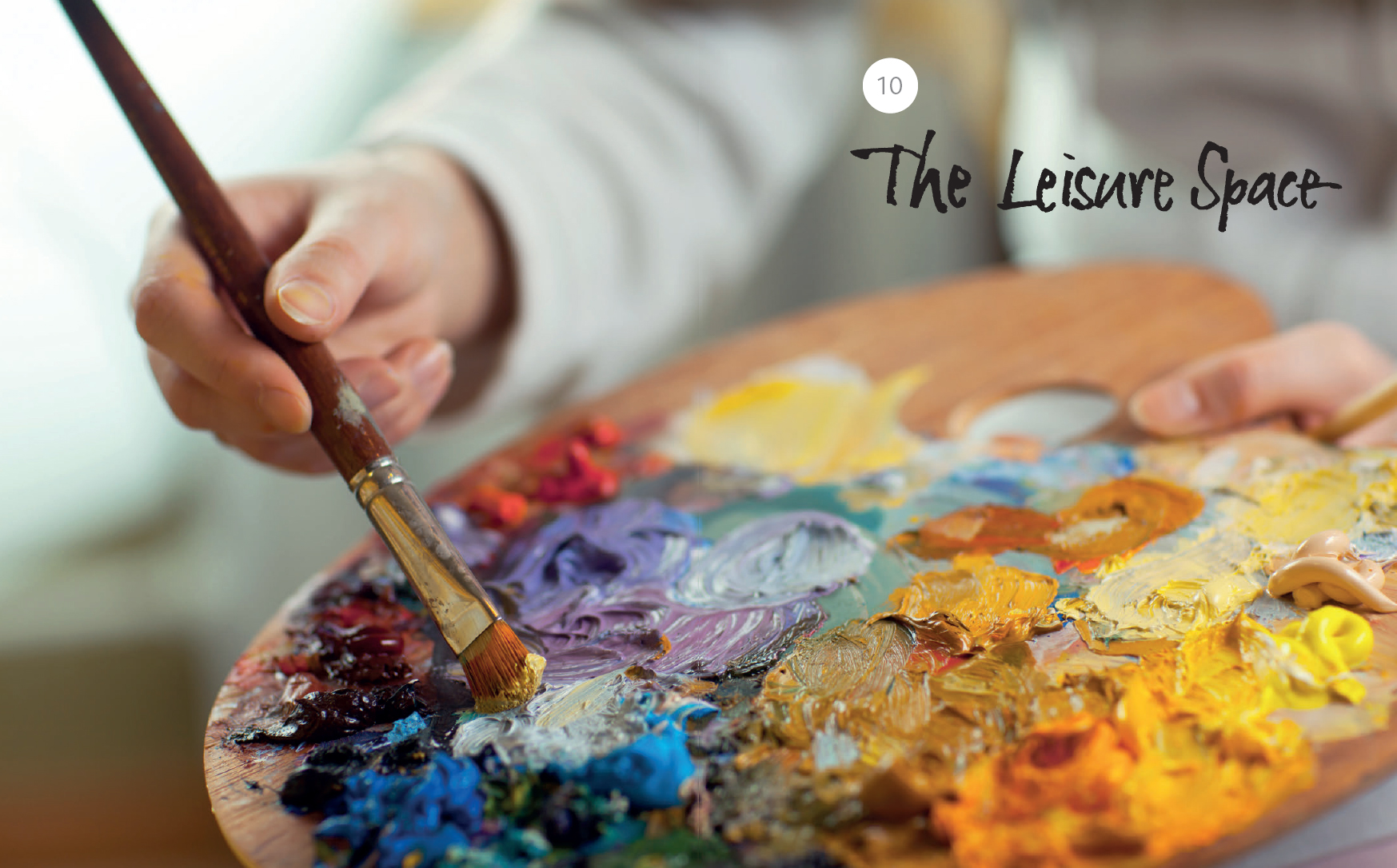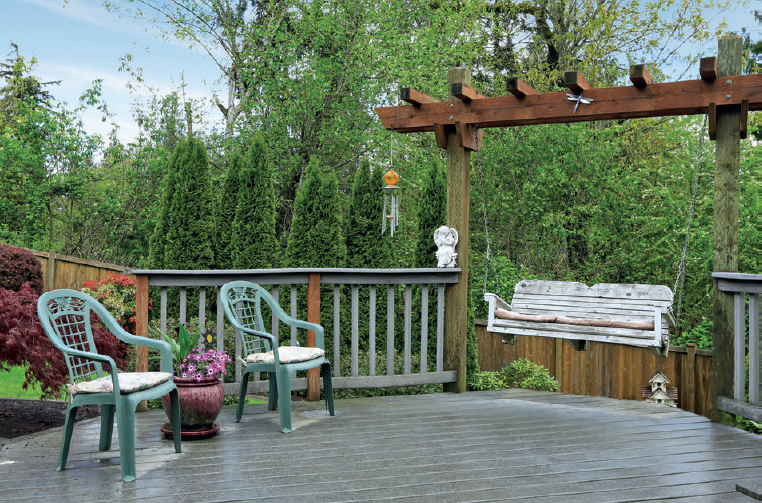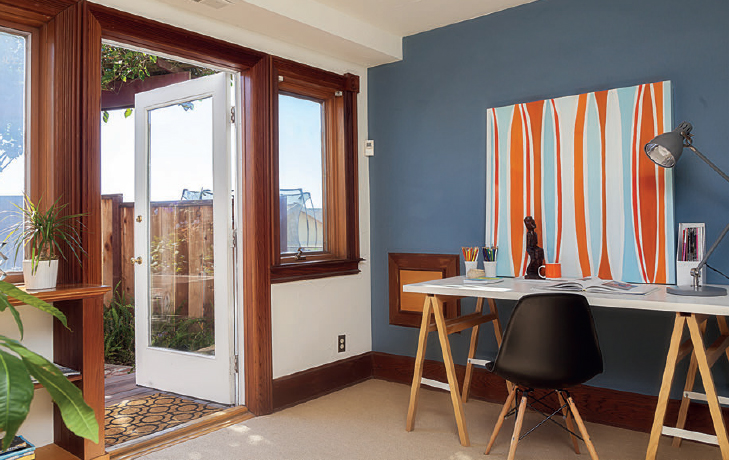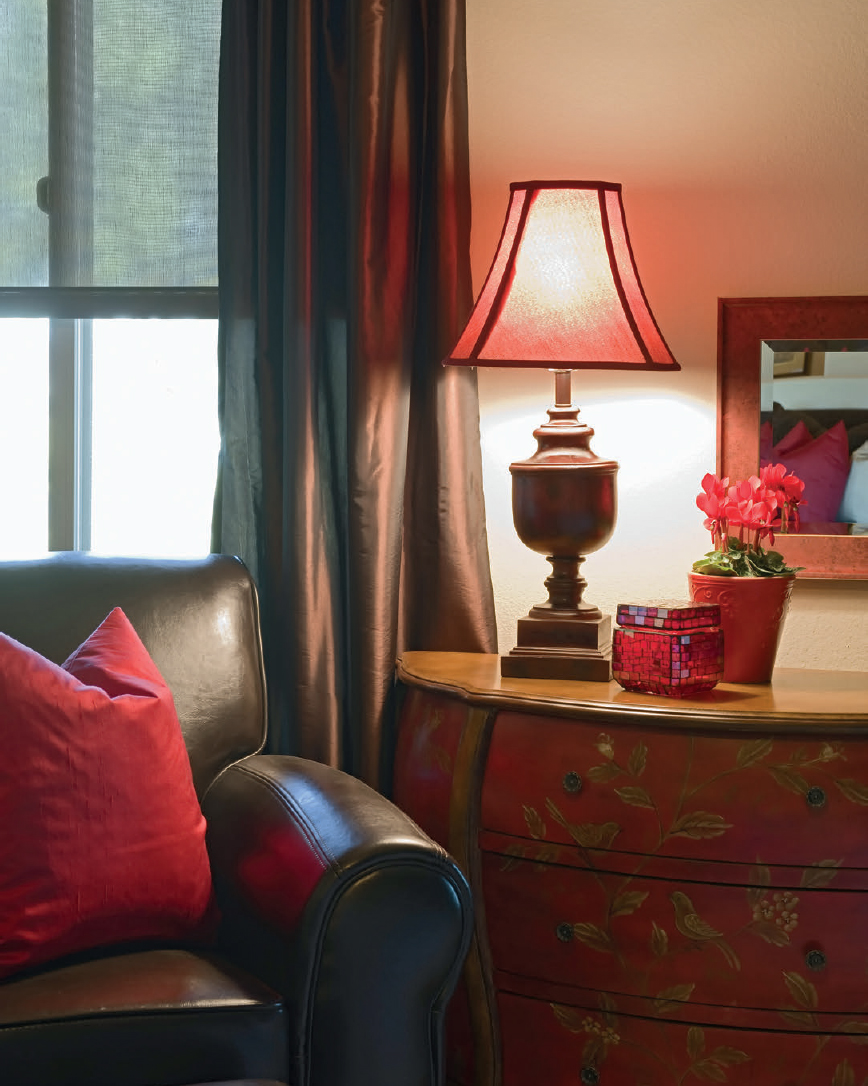
Just as trying to separate one side of a coin from the other, it is hard to inquire into leisure without considering work as well. Increasingly in many countries, people are working from home, too — perhaps one or two days a week are spent working from home instead of at the office, or you might run your own business from the spare room. So we will explore how working life is the background to our leisure life and how we need to be able to compartmentalize one from the other physically and/or mentally. If we can do this well, and if we can cultivate a mindful attitude, then we can reduce the burden associated with work and maybe even convert some of it into leisure.
This transformation relates to what is going on in the mental, rather than the physical, space. This chapter will therefore encompass both these areas — ‘the leisure space’ is as much, if not more, about the mind as it is about your physical environment.

The relationship between leisure and work
Leisure, by definition, is the time we are not working. It implies being free of demands or requirements and having the time to do the things we would do if we could freely choose. But there is a grey zone between work and leisure. If we are lucky, our work can be like leisure time: creative, enjoyable, interesting. We might love our work as a writer or artist, or perhaps our work involves travel; or we are a winemaker, or work on interesting community projects. Equally, our leisure can sometimes feel like work, as anyone will attest who has spent long hours jogging or at the gym, built their own deck or spent a lot of time gardening.
But whatever it is that we do, if we do it with a greater quality of attention then the activity is transformed, taking on more meaning and giving greater fulfillment. So a menial task such as making a cup of tea can be imbued with significance if seen in the right way. The Japanese tea ceremony is a great example of this. If we do something with little attention then it doesn’t matter how grand the activity it is, it will be banal and lacking in meaning. We could be the CEO of a major company providing a great service to humankind, but without focused attention we might just be turning up to work and going through the motions.
We have a curious relationship with work and leisure these days. Some people (for example many who are retired or those who are unemployed or under-employed) might feel they have too much time on their hands, with hours of the day to fill up while warding off boredom. Others who are working long hours, especially in families where both parents are working full time, find they have too little leisure time.
There are also many people who don’t enjoy their work. They may find themselves living from weekend to weekend, annual holiday to annual holiday. We might therefore think of leisure hours as being the time when we ‘really live’ while the great swathes of work hours in between are just something to be endured or survived. Of course, many people find themselves so exhausted from their working week that there is little energy left for social, active or creative leisure pursuits. The leisure time they do have is spent settling, or perhaps slumping, in front of the television.
So, before considering the leisure space in the home, it might be worthwhile taking some time to explore work first.
Choosing our work mindfully
The kind of work we choose can have a profound effect on our state, on how we feel and what we do when we get home. What would a mindful choice of work look like? Well, have we chosen a job or preferably a career — or even better yet, a calling — that fulfills, extends and interests us? Is it creative? Do we feel that we are not only using but developing our abilities and potential? Do we see the value of what we are doing for both our family and the wider community? Is it of use and service to others? Are we really following our passion? If not, then why not?
It is not necessarily easy to choose a career path that ticks all these boxes. Various factors, such as the economic climate, are outside our control but can profoundly influence career choice. We might therefore find ourselves doing whatever work is available, whether we like it or not. Fair enough — we need to work to live. But are there other issues worthy of consideration? Even if the situation is not ideal, is there a way we can take control over our perception of, or attitude to, the work we do? It is not a matter of how grand the job is. Are we not seeing the real value of what we are doing, or the pleasure given to others by the goods or services we provide? Are we being the best we can be in the position? Is I cant find something better to do really a cover for not taking the initiative to do something more meaningful? Perhaps we have more choice than we realize but we havent really stopped to look.
It is worth taking some quiet, reflective time to consider some of these questions. It matters, not least because our working day (or night) impacts on how we relate to others at home and how much energy we have left for leisure at home.
Work in the home
Work, for many, is increasingly impacting on leisure time at home, and the border between home and work environments can often become blurred. The rise of modern technology and communications has made this more possible than ever before, which is both a blessing and a curse.
Let’s now take a look at some particular work/ home issues, including working from home.
THE MENTAL TRANSITION BETWEEN WORK AND HOME
Its strange that many people spend much of their leisure time thinking about work and much of their work time thinking about leisure. It’s as if the mind is always wanting to be somewhere else rather than being where we are in the present moment. This is what it means to be unmindful.
In order for us to be able to mentally separate working life and home life it can be very useful to have a mindful ‘comma’ before arriving home from work, or before beginning work. Taking a few minutes to properly and consciously transition between these two aspects of our life — work and home — can help us to make the transition more smoothly and be far more engaged and refreshed for what awaits us. This pause might take the form of a few minutes of meditation, a shower, changing clothes or a walk in the park, but making this space really helps us to leave the past where it belongs and to be present to what comes next.
WORRY, THE GREAT MASQUERADER
One of the main things that keeps us preoccupied about work, and less able to engage at home, is worry. Worry often does a great job of masquerading as something useful. For example, much of what we think of as planning, preparation and trying not to forget work-related things, is actually worry pretending to be helpful, which is generally why we give it so much attention.
If we apply the mind purposefully, if it is focused and on-task, then we will be productive but not stressed. If the mind is distracted and churning about work then it is worry in disguise. It will be unproductive and associated with stress, pressure and an inability to switch off. Learn to recognize the difference between these two and you will save an enormous amount of grief.
TAKING WORK HOME
Perhaps we take work home with us and find that much of our time at home is invaded by work. From time to time this might be necessary, but it should be the exception rather than the rule. If it is happening all the time then consider whether you are compulsively cramming your evening with work that is really not that vital. Are you doing it because you are feeding your anxiety about being good enough, or to gain a promotion? Are you working inefficiently during working hours such that you leave things unfinished? Would it be better to go to work a little earlier or leave a little later if it means not taking work home? Are you doing a job that is going to help you to lead a happy and balanced life or is it getting in the way of a happy and balanced life? Of course, if you just love your work so much that it feels like leisure even when you are working then by all means take it home, but even then do consider the impact such a way of life could be having on your relationships.
Working from home
Perhaps it is a good and reasonable option for you to work from home. Perhaps it suits your family or lifestyle, or it is economically preferable for some reason. Or perhaps you run your own business from the garage, study or studio. It is also increasingly the case that many people, while still employed on a full-time basis, conduct some of their working days from home. Fair enough, but take care. You might need to be very conscious of separating the work and living spaces within your home.
If you work from home for some or all of your working hours, it can very beneficial to physically close off the work space so that you can mentally close off from it when you need to. Is your home space constantly reminding you of work? If so, do something about it. Can you, for example, set up your work space in a spare bedroom or study, so that you can close the door on work, both physically and mentally, when your working day is done? Know how to physically and mentally extract yourself from work and learn how to be home when you are in the home space you use for living not working.
With the rise of the smart phone, the tablet and a plethora of other technologies and devices we can be on call pretty much 24/7 these days. If your’e self-employed this might mean that you don’t miss that after-hours inquiry. If used well, such technology can be a great servant, but if used poorly then the same technology turns into a tyrannical master. We can find ourselves answering emails or returning calls at all times of the day or night, particularly if we are in charge of our own business or work as a freelance or contract worker. Over time this can create a mindset that everything is urgent and important even when it is not. It doesn’t allow the mind to switch off from work and switch on to home. It doesn’t allow us to properly refuel and refresh.
Whats the answer? Take control! Find the off button. Keep technology away from places it has no right to be, such as the bedroom or dinner table. Compartmentalize your time. Work mindfully when you work and then leave it alone when it is time to stop. If you dont then pretty soon you will be unproductive and unfulfilled at both home and work. It is also really important to help children to cultivate such disciplines early in life, not so much by your words but by your example.
Shifting our attitude to leisure at home
When is a task work and when is it leisure? That is hard to say, but one aspect of leisure is that it is free of necessity, that we choose to do the activity and that we enjoy it. Hopefully we find it fun and creative.
When we are home, how can we create more leisure time and enjoy it more? One way is to foster more enjoyment in those ‘chores’ we do on a daily basis. For example, we might need to cook in order to live but if when we are cooking we are wishing we were somewhere else, then we will add enormously to the burden associated with the task. Can we make such work more like leisure? Yes. To start with, making a task more creative will help make it more fun. You can, for example, cook and eat together or try new recipes, techniques or cuisines. Pay more attention to the activity itself rather than the habitual thinking we generally entertain about the activity. The more we notice and engage with what we are doing, the more we will learn, the more interesting it will be, the more easily the time will pass and the more efficient we will be.

Many a man loves to spend time in his shed. That’s interesting in itself, but the same activity done in the shed could be experienced as work or leisure depending on your attitude and level of engagement. To be open and engaged is an important part of what it means to be mindful. Anytime we engage fully and are present with what we are doing, the space where we are will be potentially transformed into a leisure space.

Leisure as mental stimulation
The human brain needs stimulation, creativity and active engagement to keep itself healthy. Stimulation in the form of worry is not mindful engagement, but rather what the mind does when it disengages. Leisure time and how we use it has a very important impact upon our brain and mental health.
According to research, people in their mid-seventies who were in the top quarter for engaging in cognitively stimulating activities had brains that more resembled people in their twenties; those in the bottom quarter had brains that resembled people with Alzheimer’s Disease even before they had come down with the symptoms.1 When we are not mindful and engaged, the brain slips into what is called ‘default’ mode and when we spend a lot of time in this state the brain gets gummed up with amyloid, the protein that leads to Alzheimer’s.2 Mindfulness, on the other hand, stimulates the brain to maintain the brain connections and cells it already has, and to make new ones.3,4 It also switches off default mode and reconnects attention and memory centres.5 For this reason it is associated with better cognition and memory as we age.6
Mindless leisure activities, where we don’t pay attention (such as watching television), are associated with a greater incidence of attention deficit problems in children and roughly a fourfold increase in a lifelong risk of developing Alzheimer’s compared to those who enjoy leisure activities predominantly requiring attention, such as reading, playing board games, playing musical instruments and dancing.7,8,9 The average amount of screen-based leisure time that young people engage in is over 4 hours a day and climbing way beyond what is healthy, especially with the advent of increasing forms of electronic media.10 The invasion of the bedroom by the screen, particularly the computer screen, has for many children and adolescents had a terrible effect on leisure time. By and large it has negatively impacted on their socialization and the dynamics of the family. It also means that many children are spending time unsupervised when they could be putting themselves at risk. As the bedroom has become the primary focus of leisure time it doesn’t do what it is intended to do. For many this means poorer sleep and therefore poor mental health. It is better to keep the bedroom for what it is designed for and to have a shared space in the house that is for work and study, including housing the computer/s there.
MINDFUL LEISURE TIME EXPERIMENT 1
As you go about your leisure activities, when you remember, bring awareness to your state of focus, mind and emotion. How mentally engaged are you in what you are doing? What is the effect of that activity on your state? Is there a difference between the effect of very passive leisure activities, such as watching television, and very active ones, such as playing sport or games? If you are multitasking or on social media while engaged in your leisure activities then what is the effect of that? What is the effect of ‘unplugging’ and engaging more fully?
You might wish to choose a particular leisure activity and make a conscious effort to do it mindfully. What is the effect of this on your experience of that activity, your enjoyment of it, how you feel and your state of mind afterwards?
If you want to, do this exercise with your children and see what they find.
The brain thrives on attention, curiosity and engagement and it wastes away with inattention, disinterest and disengagement. Engagement both with people and with leisure activities is vital in keeping the brain healthy. Active and creative leisure time is for the brain what physical activity is for the body. Virtual experiences are far less useful than real ones. If the amount of screen time is limited in the home then children are significantly more likely to engage in physical activity and reduce their risk of obesity.11 It’s a win-win situation.
Spaces dedicated to leisure
When we think of areas in the home we associate with leisure we generally think of the living room or lounge room but these days leisure has become increasingly synonymous with entertainment. The living room is often dominated by the television, with the whole room framed around the TV screen rather than social interaction. More luxurious homes might also have a home cinema. That’s all well and good, but it doesn’t take much to sit back and receive the fruits of someone else’s creativity rather than cultivate creativity ourselves.
In the days before we had so much entertainment on tap, leisure time required more work or input and had to be spent more creatively — we wrote a letter by hand, handmade our clothes, baked our own biscuits, got out into the garden to tend the vegetable patch, played board games or made our own music. In many ways this required us to be more mindful. Now we have labour-saving devices and buy the things we once might have made; mind you, we have to work long hours to buy those things. These days we are generally more passive in our leisure time and too much passive leisure time is associated with cognitive decline.
So what is the message here? Not that we should never enjoy the ‘guilty pleasure’ of a little passive leisure time like watching television, but that it should not be what we mostly do with our leisure time. We need to allow time to make things, learn things, do things, interact with people, read, write or paint. Do we have a space in our home that makes it easy for us to do such things? If not, then we will be less likely to do them. Perhaps you want a dedicated craft room or part of the garage for yourself or the family. We probably have one or more spaces in the home that make it easy to slump in front of a screen. Do we really need to do that?
THE MEAL TABLE
One daily activity where leisure and social interaction intersect more than anywhere else is the meal table. Do we have an eating space, whether it be in the kitchen or a dedicated dining room, which is clear, restful, attractive and easily accessible for the family meal or a meal with friends? If the meal table is covered with the detritus of daily life, or if it is being used for work rather than meals, then it is not likely to be the social hub of which tales are told many years later. Many homes have a dedicated dining room, but equally a kitchen with enough space to fit a generous dining table can be a great way to bring the creation and enjoyment of food closer. In traditional Italian homes, for example, this is common and is one way that the love of food, wine and connectedness come together. Dining al fresco when weather permits is also a lovely way to enjoy great food and company.

To be able to come to rest and engage in a focused way in a leisure space, it helps if that space is both functional and pleasant to be in. It’s fine to live in a ‘well lived-in’ rather than sterile home, but being amongst too much clutter is not going to be restful for mind or body.
One of the great spaces for healthy leisure is a comfortable reading chair with a well-positioned lamp behind it.
MINDFUL LEISURE TIME EXPERIMENT 2
You might like to experiment with an evening or a weekend away from screens, phones, email and social media. What is the effect? Do you notice withdrawal symptoms or signs of addiction or compulsion? What happens if you ride those waves and make the effort to engage more fully with where you are and who you are with?
Leisure is a vital and healthy part of a balanced life. It provides a great opportunity to be creative, productive and mindful. It helps enormously if we create a home environment that is conducive to active leisure time and isn’t dominated by passive activities. Also important is cultivating a healthy relationship between the work and home environments so that we make it possible, mentally and physically, to switch off from work and on to home when we need to.
